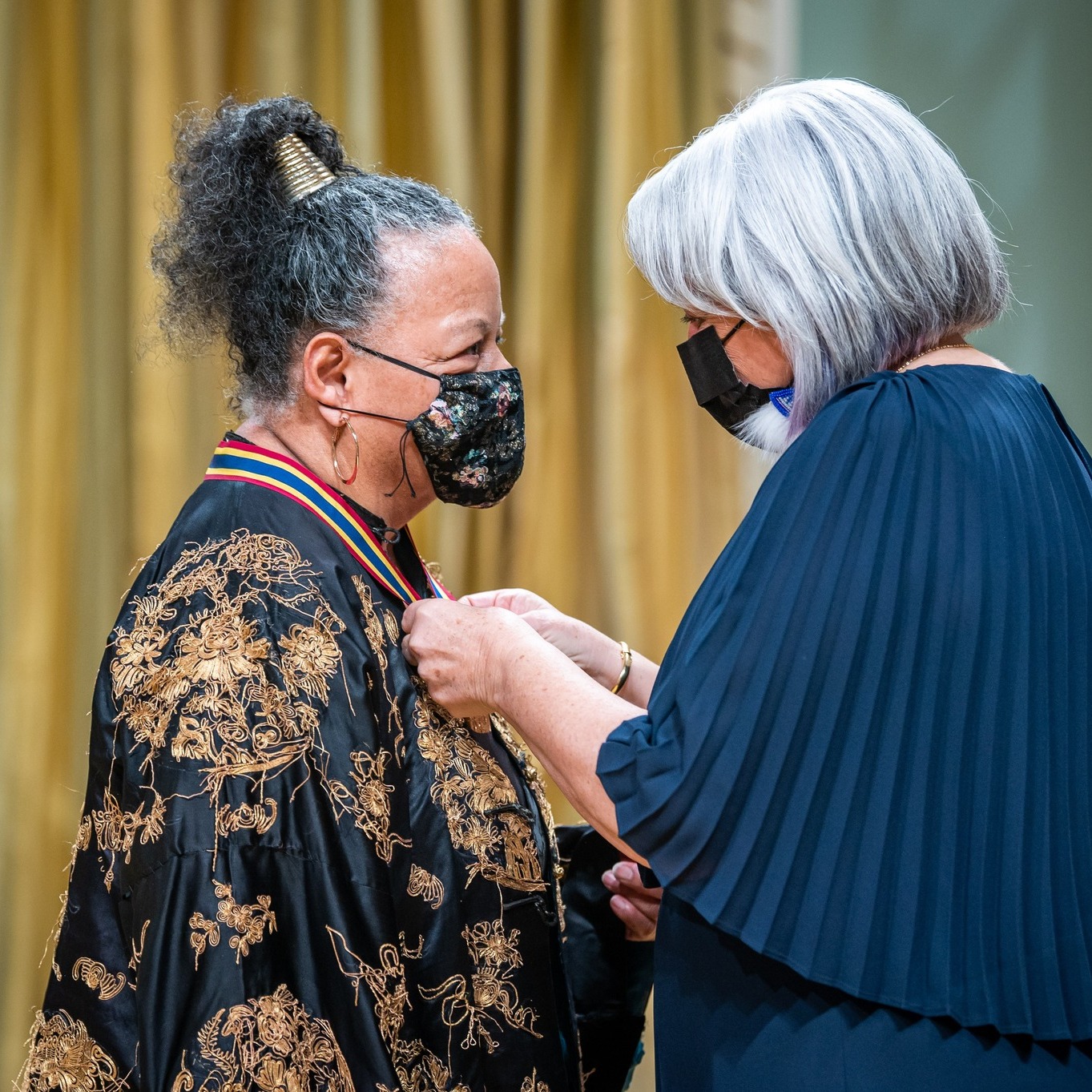A Black immigrant woman who came to Canada from Houston, Texas in 1967— with a passion for theatre — received the highest accolade of her extraordinary career last week, when Mary Simon, Governor General of Canada, placed a shining gold medallion around her neck at a ceremony, in a salute to her Lifetime Artistic Achievement in broadcasting and film.
“I feel affirmed and embraced by the country,” Rita Shelton Deverell told the distinguished gathering of art lovers and supporters who had gathered at Rideau Hall, for the black-tie event that celebrated the 30th anniversary of the award.
“To get this from the present Governor General (the first Indigenous woman to hold the position) is very special and positive.”
This latest award crowned an impressively long list of accolades in a multi-stranded career that includes theatre, broadcasting, writing and teaching — where the road to success is hard and rocky for all, even for those who do not have to grapple with racial barriers.
A member of the Order of Canada, Deverell has also won two Geminis, membership in the Canadian Association of Broadcasters’ Hall of Fame and the Black Women’s Civic Engagement Network Leadership Award.
For Deverell, the path to these and other “red carpet” moments was not at all smooth but was strewn with barriers and challenges, including overtly racist attitudes that insisted Black people had no place in broadcasting and theatre, which for decades had been perceived to be an exclusive domain of white folk.
If white women had to shatter glass ceilings to advance beyond a certain point in their careers, women of colour like Deverell had to break through ceilings of concrete.
In a wide-ranging interview with New Canadian Media the day after the Governor Generals’ performing arts awards ceremony, Deverell revealed how she cracked this impenetrable barrier with confidence, grace, courage in the face of setbacks, an innate sense of optimism and a willingness to change direction whenever she reached a dead end.
“Acting is a very difficult profession for anyone, but being Black in the 1970s didn’t help either,” she said.
A rocky road to success
A pioneer in so many ways, she achieved success without the support of advocacy groups and diversity-promoting institutions that we have today. Describing an overtly racist encounter with a CBC executive producer who turned her down for a position after Adrienne Clarkson left the show Take 30. She said the producer told her that she could not be hired as Canadians were not yet ready for a Black anchorwoman on TV.
“Of course, that was a terrible blow,” Deverell continued. “But the lesson I learned from that was that it all depended on the judgement of the boss (the person with the power to hire) When you find a good boss, stick with him/her and do the very best you can.”
Ironically, she is now on the board of directors of CBC.
Recalling her early life in Texas, she said she grew up in an all-Black neighbourhood and a segregated school system but was fortunate in some ways.
“Both my parents had decently paid jobs, and they gave me a firm belief that I had the right to live and work in any field that my talents and hard work would take me,” she said.
She went on to pursue post-graduate studies in the history of religion at Columbia University, New York where she met Canadian Rex Deverell, a graduate student of theology. Their shared passions for theatre and the history of religion soon led to a romantic relationship. Shortly after their marriage in 1967, they moved to St. Thomas, Ontario, where Rex was appointed minister of a Baptist Church.
Deverell now found herself in a small, rural town with her master thesis on the history of religion to complete, and experience in theatre from volunteering in a segregated theatre in her hometown. The prospects of landing any job, let alone one that aligned with her passions and interests, seemed non-existent.
“In sheer desperation, I wrote to everyone I could in the yellow pages, and eventually put together a package of three gigs for myself,” said Deverell. “I created an arts therapy program for a children’s village in London, Ont. I taught a course at Fanshawe College on the history of religion, and also worked at an arts centre started by a professor at the University of Western Ontario.”
She says she “fell’ into broadcasting when she asked a contact at the United Church if he knew of any opportunities, and he pointed her to a research position for a children’s TV show produced at Berkeley Studio in Toronto. She applied, got the job, eventually became the co-founder and Vice President of Production of Vision TV, and hosted several CBC shows including Take 30.
She is one of Canada’s first Black women to be a TV host and network executive. With her deep commitment to social justice, she gave a voice to those whose voices are seldom heard in the media.
The complete list of her accomplishments is an impressively long one, but asked what her own favourites are she said: “Being a co-founder of Vision TV and the news director of APTN (Aboriginal Peoples’ Television Network) where I mentored my successor.”
In addition to being a current board member of CBC, Deverell is a trustee of the Royal Ontario Museum and is Chancellor of Lakehead University, Thunder Bay.
Asked what advice she has for new Canadians and other groups facing career obstacles, she said: “It’s important to cultivate multiple networks and form alliances with supportive people. Don’t put all your eggs in one basket. When one door closes, look for others.”
She said that optimism and a refusal to become discouraged are also important, “but that is temperamentally driven and easier for some people than others,” she added.
Ottawa-based writer/journalist, editor, blogger, communications professional seeking freelance opportunities in political and travel writing.





